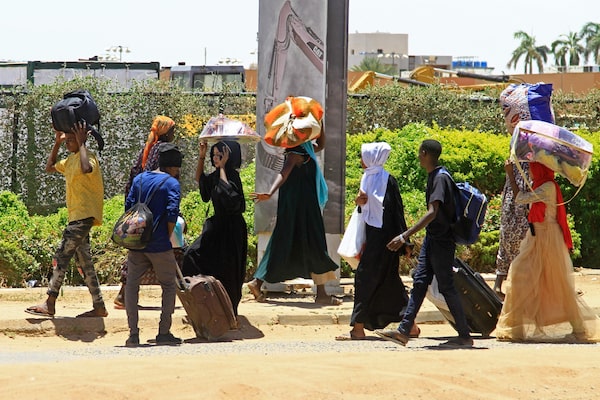
People flee from southern Khartoum on April 18 as fighting between the army and paramilitary forces led by rival generals rages for a fourth day, despite growing international calls for an end to hostilities.-/AFP/Getty Images
Clashes between military and paramilitary forces in Sudan have continued to kill and injure civilians for a fourth day, in defiance of a ceasefire announcement, as diplomats worked frantically to prevent the battles from expanding into a regional conflict that could drag in neighbouring countries.
The fighting that erupted on Saturday has killed 270 people and injured more than 2,600, according to a sharply higher casualty count provided on Tuesday by the World Health Organization, citing the Sudanese health ministry.
Sudan’s conflict explained: What’s behind the latest fighting?
Explosions and gunfire shook Khartoum again on Tuesday night, despite a 24-hour internationally brokered ceasefire that was intended to begin at 6 p.m. local time, and fighting was also reported in several other towns across the country. Humanitarian agencies said they were continuing to suffer looting raids and assaults on their staff.
Many hospitals were shutting down as they ran out of medical supplies and fuel for generators, and some were being commandeered for military purposes. Ambulances have been hijacked with patients and paramedics inside, WHO officials say. In total, they said, 16 hospitals have been forced to close, and another 16 are close to being non-functional owing to staff fatigue and lack of supplies.
“We’re receiving reports of attacks and sexual violence against aid workers,” said United Nations emergency relief co-ordinator Martin Griffiths in a tweet. “Our office in South Darfur was looted. This is unacceptable and must stop.”
The two sides in the battles, the Sudanese army and the Rapid Support Forces (RSF) militia, both have close links to military forces in other countries in Africa and the Middle East, raising fears of a broader proxy war or regional conflagration.
Two nearby countries are already seeking to provide aid to the RSF, according to Sudanese army general Shams al-Din Kabbashi, who made the allegation on Tuesday in an interview with Al Arabiya television.
He did not identify the countries, but the RSF has a close relationship with Eritrea and the United Arab Emirates and with some factions in Libya and Chad.
Egypt, meanwhile, has reportedly deployed its special forces and fighter jets to support the Sudanese military, a long-standing Egyptian ally. On the first day of the clashes, RSF forces captured the Merowe military base in northern Sudan and detained an Egyptian army battalion that was stationed there. Since then, the Sudanese army has regained control of the base, but the fate of the Egyptian soldiers is unknown.
“The concern is that the fighting might escalate and destabilize the region,” said Christopher Tounsel, a Sudan specialist at the University of Washington, in a commentary published this week.
U.S. and other diplomats were reported to be intensely lobbying the leaders of neighbouring countries to try to prevent any foreign intervention that could worsen the fighting.
“Washington’s top priority seems to be in ensuring that neighbouring states and regional actors do not take sides in this conflict and decide to get involved,” said Cameron Hudson, a former chief of staff to several U.S. special envoys to Sudan.
“That could quickly see this spiral into an even costlier regional conflict,” he said in an analysis for the U.S.-based Center for Strategic and International Studies.
U.S. Secretary of State Antony Blinken made phone calls on Monday to the Sudanese army commander, General Abdel Fattah al-Burhan, and the RSF commander, General Mohamed Hamdan Dagalo, to push for a ceasefire.
Gen. al-Burhan is the leader of Sudan’s military junta and Gen. Dagalo is the deputy leader. They were united in 2019 when they toppled the dictator Omar al-Bashir in a coup, and again in 2021, when they led another coup to entrench their rule. But in recent months they have become embroiled in a power struggle as they feud over their roles in a future government that – according to a recent agreement after lengthy negotiations – should finally be civilian-led.
The foreign ministers of the Group of Seven countries, including Canada, issued a statement on Tuesday condemning the fighting and calling for an immediate end to hostilities without preconditions.
“We call on all actors to renounce violence, return to negotiations and take active steps to reduce tensions and ensure the safety of all civilians, including diplomatic and humanitarian personnel,” the G7 statement said.
But despite the latest flurry of activity, history shows that international diplomacy in Sudan has often been ineffective. Critics say Western governments and UN envoys for years have been too naive about the promises from the junta leaders and too willing to let the military commanders delay the negotiations over the planned transition to civilian rule.
“Playing along with their games has divided the pro-democracy movement and further weakened the hand of civilians,” said U.S. Senator Jim Risch, the ranking member of the Senate Foreign Relations Committee, in a statement this week. “The international community gave these selfish and brutal leaders more time to run out the clock, through a conspiracy of optimism.”
Eric Reeves, a Sudan expert at the Africa-based Rift Valley Institute, said the international diplomats failed to exert enough pressure to ensure progress toward civilian rule. “Leaving two armies and two generals within a single politically fractured country was a recipe for disaster,” he told The Globe and Mail.
The diplomats should have made greater efforts to include leaders of the pro-democracy street protests in the negotiations, Mr. Reeves said. “Unless ‘the street’ is heard, there will be no real progress toward meaningful civilian governance.”